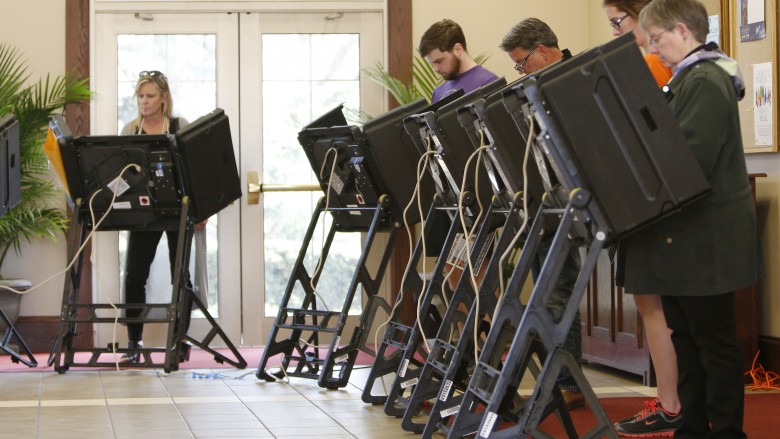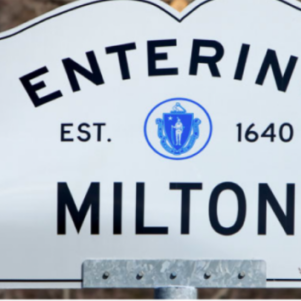Survey finds mixed levels of early voting preparedness
By State House News Service | August 5, 2016, 6:30 EDT
 (AP Photo/Jay LaPrete)
(AP Photo/Jay LaPrete) STATE HOUSE — Election reform advocates are finding mixed levels of preparedness for the state’s first experiment with early voting, which begins in 81 days.
According to survey results released Thursday by the Massachusetts Election Modernization Commission, 138 cities and towns — nearly 40 percent of the state’s municipalities — are in the final stages of planning for their implementation of early voting while 13 percent, or 49 communities, had not yet started planning. Another 126 communities have begun the planning process.
Officials in the remaining 38 cities and towns could not be reached for the survey, which was conducted in June and July by Common Cause, MASSPIRG and the League of Women Voters.
“Many communities all around the commonwealth are making decisions now that are going to expand ballot access and make sure voters have every possible opportunity to exercise their right to vote in November,” said Gavi Wolfe, legislative counsel for the ACLU of Massachusetts. “But many other municipalities have not yet developed concrete plans for early voting, and we’re here to ask them today to step up.”
After a package of election law reforms passed in 2014, this fall’s general election will be the first time Massachusetts voters will be able to cast their ballots before Election Day. Unlike with absentee ballots cast by people unable to vote during regular polling hours, voters will not need an excuse to vote early.
Every city and town in the state is required to offer early voting at at least one location during business hours, beginning on Oct. 24 and running until Nov. 4.
Common Cause Massachusetts assistant director Eric Kashdan said the survey results show “excellent progress” in the leadup to the launch of the inaugural early voting period.
Of the state’s 25 most populous municipalities, 11 have draft or final early voting plans ready, nine have ideas toward a plan, and five — Brookline, Cambridge, Chicopee, Malden and Taunton — reported having no implementation plans for early voting, survey results show. Eight of the 43 most populous communities — those with more than 35,000 residents — have concrete plans, Wolfe said.
Coalition members said municipalities’ plans may have changed or progressed since they replied to the phone survey, which ran from June 9 until July 20.
At least 13 cities and towns — Boston, Easton, Holyoke, Lancaster, Lenox, Marshfield, Milton, New Bedford, Peru, Rehoboth, Salem, Waltham and Worcester — plan to offer early voting at multiple locations.
Of the communities that have some sort of early voting plan developed, at least 175 are likely to have evening hours and 83 are likely to have weekend hours, according to the survey.
According to the coalition, evening and weekend voting hours are crucial to accommodate all voters.
“Last year, I was doorknocking in Springfield, and it’s heartbreaking and it’s hard to really get that feeling when you talk to the elder woman and say have you voted, and she says ‘No, I am not feeling well and the line is too long . . . ” said Neighbor to Neighbor organizing director Jose Palma. “It is hard when you are doorknocking in the city of Lynn and ask for the person who is registered to vote and they say ‘No, he is not here, he is working two jobs.”
Cities and towns are required to submit their early voting plans to Secretary of State William Galvin in October, Common Cause director Pam Wilmot said.
Galvin’s office in May released a set of regulations governing the early voting process, calling or early voting to be set up in municipal offices or other centrally located buildings that are large enough to accommodate voters and accessible to people with disabilities.
Galvin has said the law left cities and towns with a “great deal of autonomy” for how they wish to administer early voting and that his office encourages municipalities to open multiple early polling places.
Wilmot said that communities have significant flexibility in how they staff the polling sites and that paying election workers makes up the bulk of the cost for implementing early voting.
“Smaller communities can have just their regular staff — their clerk, the people that are working in the office — handle it,” she said. “With multiple sites, you need more staffing, but it does not need to be the full complement of poll workers that you would have to have by law in an election. It’s very flexible. You can have whatever staffing is needed. Communities have gone everywhere from appropriating almost no money for it to quite a bit.”
The Legislature on July 23 overrode a series of Gov. Charlie Baker vetoes to the budget for Galvin’s office, restoring $4,000 to an account dedicated to early voting. Senators said during debate that Baker had slashed a total of $1.2 million from early voting funding through various accounts, money that lawmakers ultimately restored. Sen. Benjamin Downing said that allowing the vetoes to stand would have shifted the cost burden onto municipalities.
— Written by Katie Lannan
Copyright State House News Service











